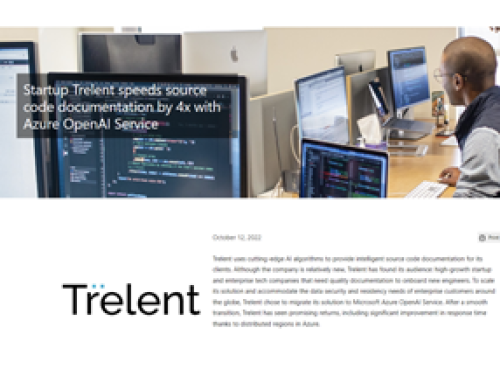It's an innovator artificial intelligence tool which is just over half a year old and is already 'taking the world by storm' as the big sensation in new technologies. ChatGPT is a chatbot (software (which allows conversations to be held in real time, by text or voice) developed by the company OpenAI, which uses natural language processing to communicate. The result is a much more natural interaction, similar to contact between two human beings.
Although it's still new, this technology has been under the spotlight, both because of some ethical issues that may arise and because of the uncertainty about the changes it could bring to the labour market. But also because of its innovative and unprecedented nature and the various advantages it can bring.
Among the organisations that can make the most win with ChatGPT are companies, especially retailwho live off contact with customers and the sales they can generate. It promises to be a powerful tool for boosting sales and promoting customer satisfaction.
At a time when the old maxim that 'the customer is always right' is more relevant than ever, with very informed and demanding consumers, ChatGPT can really make a difference.
Advantages of ChatGPT for company invoicing
ChatGPT allows you to improving sales strategy and customer satisfaction, enabling a more personalised service and suited to their needs, better communication between brands and consumers and, overall, a more pleasurable consumer experience.
Few things are more frustrating for a customer than trying to answer questions, place orders or communicate needs and being ignored by the company. Especially when it comes to e-commerce. Providing consumers with a customer service that creates the notion that there is a close and effective contact channel is half the battle to increase customer loyalty, commitment to the brand and strengthen the profitability of each customer. Few things are as attractive to consumers as quality customer service.
Thus, thanks to the provision of personalised sales support and approaches, ChatGPT tends to contribute, for example, to better conversion ratesThis increases the likelihood that visits to e-commerce sites will result in actual purchases. By providing quick and precise answers to users' requests and questions, they will have a good first contact with the brand - with less waiting time and less frustration - and the chances of making a purchase will increase.
The company can also give it a more personalised touch, in line with the brand positioning and policyby choosing the voice and tone with which you interact with customers. Or even adapting the ChatGPT style to each type of audience and strategy of the moment.
Another advantage is, of course, the release of resourceshuman resources, which no longer have to be allocated to customer contact so that they can focus on other important areas of the business; and time, since the automating tasks allows you to free up hours for sales where the human factor really makes a difference.
What changes with ChatGPT
It's true that many companies already had technological tools for contacting customers, but these were of poor quality. The notion of communicating with a robot was much more evident, the possibilities for interaction limited and the degree of action very low.
ChatGPT can be eerily similar to a human in its ability to generate similar responses, interact and respond to what is asked of it, thanks to natural language processing. By analysing data collected on customer behaviour onlineChatGPT is able to provide relevant information and give appropriate answers that match each user's profile. On the other hand, the greater the number of interactions with a given user, the more likely it is that ChatGPT will be successful in feedback that he gives, because the knowledge he gains of it is greater, due to the history of orders, consumption and queries he makes
A wide range of uses
For companies that wish to use ChatGPT as business toolThere are many possibilities for using artificial intelligence to boost and generally promote company development and growth. However, the first step must necessarily be to identify the specific needs of your business and, therefore, where this artificial intelligence technology can add value.
Perhaps the most visible use for the general public has to do, in fact, with the use of ChatGPT in the various existing sales channels, such as the company's website (or websites) and social networks.
ChatGPT can also be used to help start the contact with potential customersby gathering and providing information such as product details, industry trends and other data that might attract them and hold their attention.
What's more, it can be a more strategic tool and not just one that is tied to greater immediacy. ChatGPT can potentially help to localise potential clients, strengths and weaknesses of the company's business. marketing of the company and, as a result, the search for more effective sales policies.
Maintaining and retaining customer loyalty is no less important and this is also an area where ChatGPT is an asset. Bearing in mind that competition is growingAs everything changes so quickly and customers are increasingly attentive, ensuring that they remain satisfied after purchasing a product or contracting a service is essential. O ChatGPT can help design strategies for managing customer portfolios, by answering questions, updating information, helping with difficulties in using the goods or services purchased or even detecting new needs that may not be being met and may lead to a search for another supplier.
ChatGPT is another great help when it comes to analysing sales. It can very quickly study sales data, provide information on the company's performance and give recommendations on how to improve the strategy and thus achieve better results. On a more sophisticated level, it can also provide personalised recommendations for specific customers or markets.
Despite fears about the impact that artificial intelligence technologies such as ChatGPT could have on jobs, particularly in this area of sales, there are many who value above all the role of this type of tool in improving company performance and supporting those who work there. Rather than fearing technological innovation, it's important to think about how it can be used to serve people and organisations.
by Maria Ana Barroso





